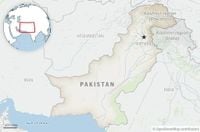The rugged hills of northwestern Pakistan erupted in violence this week, as the country’s security forces launched a series of deadly raids following a militant ambush that left 11 soldiers dead. The attacks and swift response underscore Pakistan’s ongoing struggle with militancy along its border with Afghanistan—a conflict that has only intensified since the Taliban’s return to power in Kabul in 2021.
It all began on Wednesday, October 8, 2025, in the Orakzai district of Khyber Pakhtunkhwa province. According to The Economic Times and the Associated Press, a military convoy was ambushed by militants, resulting in the deaths of 11 Pakistani soldiers, including two senior officers. The Pakistani Taliban, also known as Tehrik-e-Taliban Pakistan (TTP), quickly claimed responsibility for the attack in a brief statement released the same day.
In the immediate aftermath, Pakistani security forces wasted no time in mounting a response. Acting on intelligence, they conducted multiple raids on suspected militant hideouts in Orakzai on Wednesday and Thursday. The military reported that these operations killed 30 militants, all identified as members of the group referred to as "Khwarij"—a term the government uses for militants it accuses of being backed by India, including those associated with the banned TTP. The military’s statement, cited by Japan Today, declared, “These successful operations have avenged the heinous act and brought the main perpetrators to justice.”
But the violence didn’t end there. On Friday, October 10, a group of Pakistani Taliban militants, including suicide bombers, struck a sprawling police training center in the northwestern city of Dera Ismail Khan. Emergency services and police scrambled to respond as multiple blasts and ongoing gunfire were reported. District police chief Sajjad Ahmad confirmed that the exchange of fire with the attackers was still ongoing, while local residents described hearing a series of explosions followed by relentless gunshots. Reinforcements were rushed to the scene as authorities tried to regain control.
The Pakistani Taliban once again claimed responsibility for this brazen attack, further stoking fears of a resurgent insurgency. According to The Economic Times, the group’s brief statement asserted their involvement in both the Orakzai ambush and the Dera Ismail Khan assault.
Pakistan’s military leadership responded with stern warnings and renewed calls for regional cooperation. At a news conference in Peshawar, army spokesperson Lt. Gen. Ahmad Sharif urged Afghanistan’s Taliban government to prevent the use of Afghan soil for attacks on Pakistan. “We urge the Afghan Taliban government not to allow Pakistani Taliban to use Afghan soil for attacks in Pakistan,” Gen. Sharif stated, echoing a demand that has become increasingly urgent since the Taliban regained control of Kabul.
The military’s statement also did not shy away from pointing fingers beyond its western border. Pakistan has long accused India of supporting separatists in Balochistan and backing militants like the TTP—allegations that New Delhi has consistently denied. The term “Indian-sponsored Khwarij” used in official communications reflects how deeply these suspicions run. As cited by Associated Press, the military emphasized that operations would continue to “hunt and eliminate any other Indian-sponsored Khwarij in the area,” reaffirming their determination to eradicate terrorism from the country.
The political leadership echoed the military’s tough stance. On Thursday, October 9, Defense Minister Khawaja Mohammad Asif addressed Parliament in Islamabad, vowing a hardline response to the attacks. “Pakistan would show ‘no leniency’ in responding to such attacks and target insurgent bases,” Asif declared, according to Associated Press. He reiterated that the country would not hesitate to strike at "those places from where insurgents attack our security forces," signaling a willingness to pursue militants across borders if necessary.
These recent attacks are part of a broader pattern of escalating violence that has gripped Pakistan in recent years. Much of the bloodshed has been claimed by the TTP, a group that, while separate from Afghanistan’s Taliban, has grown emboldened since the latter’s takeover of Kabul in 2021. As Japan Today notes, many TTP leaders and fighters are believed to operate from sanctuaries just across the Afghan border, complicating efforts by Islamabad to root them out. This cross-border dynamic has strained relations between Pakistan and Afghanistan, with Islamabad repeatedly urging Kabul to do more to rein in the militants.
The resurgence of the TTP has deep roots. The group has long been active in Pakistan’s tribal regions, launching attacks on military and civilian targets alike. But the collapse of the previous Afghan government and the Taliban’s return to power in Kabul provided fresh momentum for the TTP’s activities. Analysts suggest that the Taliban’s victory in Afghanistan has served as both inspiration and practical support for their Pakistani counterparts, who have ramped up attacks on both security forces and state institutions.
Meanwhile, the persistent allegations of Indian involvement add another layer of complexity to the conflict. Pakistan’s claims that India backs separatists and militants within its borders are a longstanding feature of the two countries’ fraught relationship. India, for its part, has repeatedly denied any such involvement, insisting that Pakistan should focus on addressing its own internal security challenges. The rhetoric on both sides has only grown sharper in the wake of these latest attacks, with each government accusing the other of fueling instability in the region.
For ordinary Pakistanis living in the affected areas, the violence is a grim reminder of the dangers that persist despite years of military operations. The ambush in Orakzai and the attack in Dera Ismail Khan have left communities shaken, with many residents expressing fear over the possibility of further attacks. The government’s promises of “no leniency” and continued operations offer some reassurance, but the underlying drivers of militancy remain stubbornly in place.
As the dust settles from this week’s bloodshed, Pakistan faces a familiar but daunting challenge: how to secure its borders, root out militant networks, and navigate the complex web of regional rivalries that fuel the violence. The coming weeks will likely see continued military operations and diplomatic maneuvering, as Islamabad seeks to demonstrate both resolve and resilience in the face of mounting threats.
With the Pakistani Taliban once again making headlines, the stakes for stability in the region could hardly be higher. The country’s security forces have struck back hard, but the road to lasting peace remains uncertain—and fraught with peril at every turn.


